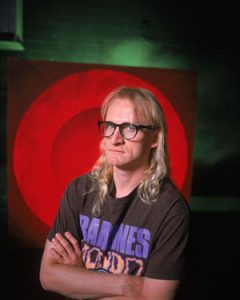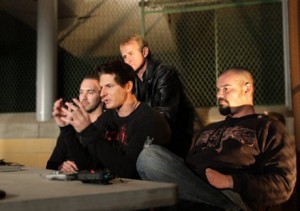Apr-25-2011
The Junction
Truth, Trust and the Magic of Mulder & Scully: 13 Questions for X-Files Writer and Producer Frank Spotnitz
[Original article here]
Hardly any other series left such a profound impression on the 90s like the sci-fi cult show The X-Files. Not only did it win an incredible amount of awards, attracted a huge fan following and led to two movies, but it also influenced the way stories are told on the small and the big screen. Even today many shows continue to cite The X-Files in one way or another: Be it LOST, Bones, House M.D. or Fringe – just take your pick. And if everything goes according to plan and the optimism of many fans, a third movie should hit screens next year – after all the complex mythology about aliens, invasion and conspiracies makes it a necessity. We got together with X-Files writer and producer Frank Spotnitz to talk about the impact of the show as well as about his experiences as a storyteller.
Source: Anastasia Hansen and heART
So what is it exactly that made and makes The X-Files such a hit? It is a mix of different aspects – the high quality of the scripts, directing and acting, the mix of creepy and funny stories, the challenging mythology, the unique score by Mark Snow, the atmospheric camera work and, of course, the main characters Mulder and Scully. Two smart characters with different belief systems and world views that were always treated as equals – and even led to a gender role switch to a certain degree: While Mulder is the more intuitive and open-minded character, Scully’s rationalism exhibits more supposedly male qualities. Not to mention the sizzling chemistry between the two: Hardly has unresolved sexual tension been more attractive. When the resolving part does finally take place, it happens off-screen.
Hence it should come as no surprise that The X-Files is still very much alive today. Especially the online community is very active and offers a diverse source of creativity. During the early 90s the show was actually even one of the first to play such an important role within the internet world. When you search for it today, you find a wide range of online forums, creative video editors, news networks, conventions and even charities.
TheJunction: How do you approach storytelling and writing a script?
Frank Spotnitz: When I’m looking for a story to tell, I look for something that I care about, both emotionally and intellectually. The emotional connection comes first. That’s the fuel that drives me through the process of devising the story. But at the same time, I’m thinking about what my story is saying, what questions it’s asking about life. And whether I feel I’m saying something true. That may seem surprising coming from someone who’s written so many stories in the supernatural genre. Ironically, I find it’s easier to identify interesting ideas in supernatural stories. If you’re going to depart from literal reality, then you have to think about why you’re doing that, and what rules govern the reality you’re creating. And in that process I invariably end up finding something I want to say about life.
My frame of mind each time out is that I’m going to try to write the best thing I’ve ever done. I tend to be very meticulous in the process of drafting a story. I typically spend weeks devising the story for an hour of television, thinking about each scene, how they end and begin, the journeys the characters take, what makes the story work. Then I sit down to write, and try to make my first draft as polished and well crafted as if it were my final draft. It never ends up being my final draft, of course — the cliché that most of writing is rewriting certainly holds true for me. But the stronger the first draft, the stronger the platform upon which to build all my revisions.
Please tell us about your current projects.
I have many projects in development, most of which I can’t really talk about yet. The movie and television business is speculative, so you often have to cast a lot of lines before you get a network or a studio to bite. The project that’s occupying my every waking hour right now is tentatively titled Morton. It’s a spy thriller commissioned by the BBC and co-produced by Kudos Film and Television.
How did you find your way into storytelling and the film industry?
Circuitously. I wanted to be a writer, actor or director from a very young age, but I ended up getting sidetracked by journalism. My first quarter at UCLA, I had this amazing journalism professor, Jim Howard, and I just fell in love with the idea of being a reporter. I ended up writing for wire services for seven years — in Indiana, New York and Paris — before I realized I didn’t love it enough to stick with it. So I moved back to Los Angeles and studied screenwriting at the American Film Institute, where I was blessed with two more wonderful teachers, Beth Sullivan and Howard Dimsdale. The X-Files was, believe it or not, my first job in Hollywood.
How did you become involved in The X-Files?
Dumb luck. I’d met Chris Carter in a book group while I was in film school. The book group ended, we didn’t really keep in touch, and he went on to create The X-Files. Toward the end of the first season, an old friend of mine who knew of my connection to Chris asked if I’d call on his behalf to see if he could pitch an episode. I felt somewhat uncomfortable doing it, but made the call anyway. Chris said he wouldn’t hear my friend’s pitch, but he’d hear my ideas, if I had any. Up to that point, I’d never thought of writing for television. I thought I was going to write movies. But I figured what the hell. So I came up with three story ideas, went in to pitch them, and Chris promptly shot them all down. I thought that was the end of it, but then a few weeks later, I got a call from Chris. He said two writers were leaving the show — I later found out this was Glen Morgan and Jim Wong — and asked if I’d like to come onboard as a staff writer. I couldn’t believe my good fortune. I still can’t.
What do you think was decisive for the major success of the show?
So, so many things. When you have a big success like The X-Files, you have to do everything right — and then get lucky. I think it started with an amazing pilot episode, and the inspired casting of David Duchovny and Gillian Anderson. From there, the competition between Chris, Jim & Glen and Howard Gordon & Alex Gansa made for a first season that just got better and better. And I would argue that competition to outdo ourselves continued until the very end. It’s incredible to look at the creative trajectory of the show, how restless our imaginations were, and how it just got more and more sophisticated.
How important is the relationship to the fans for you?
I think The X-Files was the first series to have a deep relationship with its fans via the Internet. While we were writing the show, I’d frequently check out the newsgroups, and then the message boards, to see how fans were responding to the stories. Especially with the mythology episodes, it was incredibly useful to see what ideas were landing and which weren’t. In one instance, a fan’s question about the aftermath of Melissa Scully’s death inspired a two-part episode (Piper Maru & Apocrypha). The interesting thing is that the fan base evolves. I suspect of the people who are talking about and following The X-Files online now weren’t online when the show was first broadcast.
What makes the relationship between Mulder and Scully so unique?
You can’t overstate the importance of David and Gillian’s performances, or their chemistry together. Beyond that, I think it’s enormously appealing that Mulder and Scully are two incredibly smart people with boundless respect for one another, despite their profoundly different points of view. During the course of the series, it was their work that brought them together, but also kept them apart.
Since you explore the profound connection between being an author and storytelling in the episode Milagro, how do you perceive the interrelation between an author and the story he/she is telling?
It’s a very interesting subject to me. One of the reasons Milagro is one of my favorite episodes is because it’s about the power of storytelling. The mythologist Joseph Campbell once said that people need stories to survive — not “want,” “like” or “desire,” but “need.” When I first heard that, I thought it was an overstatement, but I’ve come to believe it’s true. Stories help us make sense of the world in which we live. We connect to the emotional lives of fictional characters in a very intimate way that can be incredibly helpful to one’s life. That’s certainly true for me — stories and fictional characters helped me get through some difficult times as a kid, and they still help sustain me in many ways. I am aware when I’m writing that by asking myself what’s true, what I care about, I’m learning things about myself and about the world around me. But at some point, the story becomes its own thing. And then it’s there for other people to draw from, to find meaning.
Do you have any favorite episodes or ones you are particularly proud of? If so, why?
I love the fact that The X-Files was so many series in one. Just about anything Darin Morgan wrote. So many of Vince Gilligan’s episodes and the ones written by Morgan & Wong, And of course countless episodes written by Chris Carter. His craftsmanship and fierce dedication to excellence continues to inspire me.
Source: http://www.biglight.com/index.php?p=about
Are there any funny anecdotes you could share from the time the The X-Files was being filmed?
Only over a drink, and off the record.
While working on Millennium, how did you manage to keep a distance from the often dark nature of the show?
I didn’t! But it’s actually incredibly liberating writing about dark things — it helps you sort out your feelings about things that terrify you.
Do you have any advise for people striving to become filmmakers?
Don’t be afraid. If you love it, do it. But work hard. Allow yourself to be as good as you’re capable of being.
Is there anything you would like to tell those out there waiting for a third X-Files movie to be greenlit?
I still don’t have any news to share. But I won’t give up. And the fans shouldn’t, either.
Thank you for the interview! If you want to learn more about Frank Spotnitz and his production company Big Light, check out the homepage for the latest news. And until December 2012 comes around: Never give up on a miracle.




